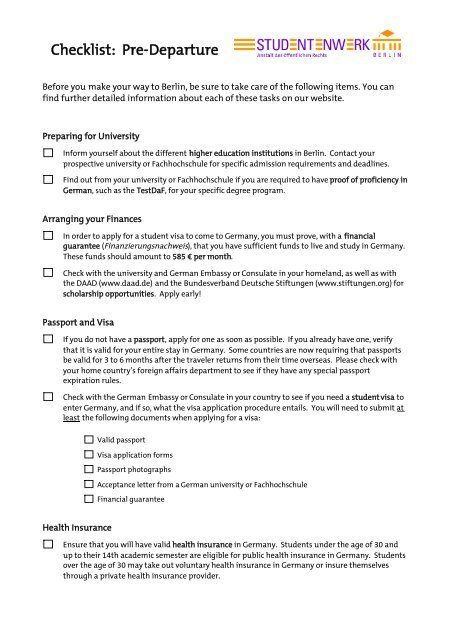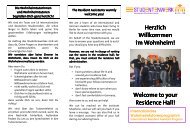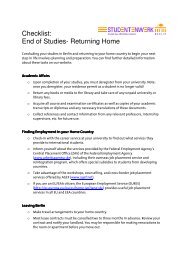Checklist: Pre-Departure - Studentenwerk Berlin
Checklist: Pre-Departure - Studentenwerk Berlin
Checklist: Pre-Departure - Studentenwerk Berlin
Create successful ePaper yourself
Turn your PDF publications into a flip-book with our unique Google optimized e-Paper software.
<strong>Checklist</strong>: <strong>Pre</strong>-<strong>Departure</strong><br />
Before you make your way to <strong>Berlin</strong>, be sure to take care of the following items. You can<br />
find further detailed information about each of these tasks on our website.<br />
<strong>Pre</strong>paring for University<br />
Inform yourself about the different higher education institutions in <strong>Berlin</strong>. Contact your<br />
prospective university or Fachhochschule for specific admission requirements and deadlines.<br />
Find out from your university or Fachhochschule if you are required to have proof of proficiency in<br />
German, such as the TestDaF, for your specific degree program.<br />
Arranging your Finances<br />
In order to apply for a student visa to come to Germany, you must prove, with a financial<br />
guarantee (Finanzierungsnachweis), that you have sufficient funds to live and study in Germany.<br />
These funds should amount to 585 €per month.<br />
Check with the university and German Embassy or Consulate in your homeland, as well as with<br />
the DAAD (www.daad.de) and the Bundesverband Deutsche Stiftungen (www.stiftungen.org) for<br />
scholarship opportunities. Apply early!<br />
Passport and Visa<br />
If you do not have a passport, apply for one as soon as possible. If you already have one, verify<br />
that it is valid for your entire stay in Germany. Some countries are now requiring that passports<br />
be valid for 3 to 6 months after the traveler returns from their time overseas. Please check with<br />
your home country’s foreign affairs department to see if they have any special passport<br />
expiration rules.<br />
Check with the German Embassy or Consulate in your country to see if you need a student visa to<br />
enter Germany, and if so, what the visa application procedure entails. You will need to submit at<br />
least the following documents when applying for a visa:<br />
Valid passport<br />
Visa application forms<br />
Passport photographs<br />
Acceptance letter from a German university or Fachhochschule<br />
Financial guarantee<br />
Health Insurance<br />
Ensure that you will have valid health insurance in Germany. Students under the age of 30 and<br />
up to their 14th academic semester are eligible for public health insurance in Germany. Students<br />
over the age of 30 may take out voluntary health insurance in Germany or insure themselves<br />
through a private health insurance provider.
<strong>Checklist</strong>: <strong>Pre</strong>-<strong>Departure</strong><br />
If you wish to continue the health insurance coverage you have at home, verify with your<br />
insurance company that you will be covered in Germany.<br />
EU, EEA, and Swiss students insured by the public health insurance company in their home<br />
country: apply for a European Health Insurance Card and/or obtain all necessary documents<br />
from your insurance provider.<br />
Students insured by a private health care company must provide a certificate proving their<br />
coverage in Germany.<br />
Your university or Fachhochschule may also provide additional information on health insurance.<br />
In order to enroll in your classes in <strong>Berlin</strong>, you will have to prove that you have health insurance!<br />
Finding a Place to Live<br />
Check out the accommodation information provided by the <strong>Studentenwerk</strong>.<br />
The <strong>Studentenwerk</strong> <strong>Berlin</strong> owns and operates 41 student residence halls across the city. You<br />
can even see what specific rooms are currently available online.<br />
You can also search for a private room or apartment in <strong>Berlin</strong> through the <strong>Studentenwerk</strong><br />
website.<br />
Getting to <strong>Berlin</strong><br />
Make travel arrangements to <strong>Berlin</strong>.<br />
Information on <strong>Berlin</strong>’s three airports, Tegel (TXL), Schönefeld (SXF), and Tempelhof (THF), is<br />
available from www.berlin-airport.de.<br />
Rail information within Germany is available from the Deutsche Bahn (www.bahn.de).<br />
Information on <strong>Berlin</strong>’s public transportation system, which offers services from all three<br />
airports and all train stations, is available from the BVG (www.bvg.de) and the<br />
S-Bahn (www.s-bahn-berlin.de).<br />
General<br />
Bring extra passport pictures with you for various administrative documents and registrations.<br />
Bring photocopies of all important documents:<br />
Passport and Visa<br />
Acceptance letter from<br />
university or Fachhochschule in<br />
<strong>Berlin</strong><br />
Medical records<br />
Vaccination card<br />
Birth Certificate<br />
Confirmation of public or private<br />
health insurance<br />
Educational and Language<br />
Certificates<br />
Copy of credit cards and bank cards<br />
Be sure to leave a copy of your passport and visa with someone at home.<br />
Remember your money – traveler’s checks, Euros, ATM cards, debit cards, credit cards, and the<br />
necessary PIN numbers.
















